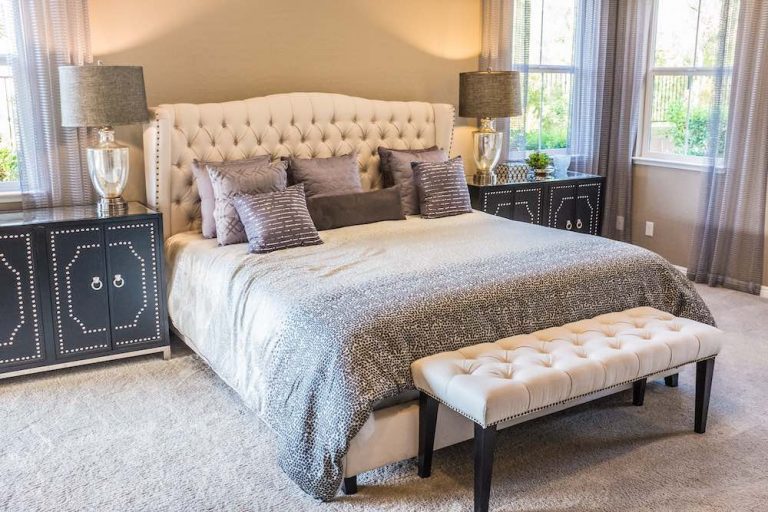The Aspire Pocket+ 1000 Memory Mattress stands out as an epitome of luxury, innovation, and sustainability. From its...
Read MoreHow to Feng Shui Your Bedroom

Having trouble sleeping? In order to get a good night of sleep, your bedroom should be a place of peace, tranquility, and relaxation. A lot of this can be done by simply rearranging the furniture in your bedroom to optimise the Feng Shui energy. You can follow a few step by step tips to help you keep everything in balance of your health and well being. Use our favourite Feng Shui tips to turn your bedroom into a haven of tranquillity and relaxation.
What is Feng Shui?
Feng Shui is an ancient Chinese art of spatial arrangement that aims to get the best possible flow of energy or “qi.” Qi is the foundation of feng shui: feng means wind, and shui means water both are elements that have a natural flow within, symbolizing the energy flow everyone should have in their lives.
Feng Shui bedroom tips
You probably spend more time in your bedroom than anywhere else in your house, so why not make sure it’s as relaxing as it can be. The average person spends about 7-9 hours sleeping in the bedroom and possibly more than that just hanging out. As you sleep, you absorb the energy of the room, so having positive energy is crucial. Having good feng shui in your bedroom gets you a good night’s sleep, invites relaxation, further bonds you with your partner and boosts your sex life! Check out these tips on how to give your bedroom a better feng shui.
The bed
The bed is the most crucial piece of furniture to place in feng shui. Your bed should have a solid headboard, preferably wood. This brings you closer to nature and gives you a sense of both comfort and support. Ideally, you should have a full sized bed or bigger to allow for a sense of permanence. This bed should be lifted off of the ground to allow for energy to pass underneath. Qi must circulate around your entire body; you do not want to block it by placing your mattress on the floor. You can get great beds from Ikea, Homebase and Tesco.
Find the best position for the bed
According to feng shui principles, the ideal place for the bed is opposite the bedroom door, but not directly in line with it. You’ll want space on three sides of the bed, with the headboard against a solid wall (though not one with a bathroom behind it). Set up this way, you feel secure and relaxed which will guarantee a restful night’s sleep.
Put your bed in a commanding position against a solid wall: no open windows that can cause drafts and disrupt your sleep. Make sure your head points towards the wall. The bed should be positioned so you can see the doorway, but you should be far away from it so you should not be aligned with the door. This will prepare you for any surprises or any danger to come.
Finally, a sense of balance is very important in feng shui. Make sure your bed is accessible on both sides and try to put a night stand on each side for symmetry. Having a rug underneath the bed will help to further ground it.
Get rid of clutter
Another big thing in feng shui is reducing clutter. Keep your room clean. Only keep essentials things in your room. This is easier said than done. Keep your bedroom doors closed at night. Bedroom clutter disrupts qi and keeps your life from moving forward in general. Do not let items and dust pile underneath your bed. Not only does it disrupt flow, but anything that lives under your bed can contribute to unpleasant dreams.
Get rid the electronics
Believe it or not electronics of any kind are just bad for feng shui. They are TVs, mobile phones even appliances. Not only are all of these items a distraction that can disrupt your sleep, but they emit electromagnetic fields, which is harmful to your health. Keeping your room simple is the key. If you must have your phone or electric alarm clock in the room then keep it at least three feet from the bed or plug it in across the room to resist temptation. If you have to have your desk in your bedroom, place it so any monitors don’t directly face the bed. Do make sure to cover them before lights out.
Mirrors
You should avoid putting a mirror in your bedroom. Mirrors reflect light and bounce energy across the room. This is yang and you want yin. This energy prevents you from winding down to sleep. Some feng shui consultants believe that a mirror across from your bed invites a third person into your relationship and encourages infidelity. If you like the idea of getting ready for the day in your bedroom, put a mirror on the inside of your closet doors and keep them closed as you sleep.
Pairs
Balance, equality and symmetry is very important in feng shui. So do have everything in pairs. Place a night stand on each side of the bed. Have two pillows. Have two lamps. Have identical chairs. Have matching artwork. This will keep your relationship strong and if you’re single, it will invite love into your life.
Pick the right colours
Using feng shui bedroom colours will help to create as peaceful an environment as possible. According to feng shui colour theory, earth tones are your best bet as they promote relaxation and don’t clash with any other stronger colours you may be using. These more forceful tones might include reds to add a sensual element or blues and greens which are good for promoting healing and vitality. If you want to dig deeper, you can find a colour scheme based on your feng shui birth element to find out the energy layout of your home. Most importantly, make sure you pick a colour you feel comfortable with, as you’ll be the one living with it every day.
When it comes to the colour of your bedroom, try to emulate skin tones: off-whites, creams, peaches, light browns, or chocolate browns. These colours are neutral and comforting. Bright, primary colours provide too much energy.
This goes for the walls, your bedding, furniture, and any other room decorations. If you love colour, you don’t have to avoid it all together. A splash here and a splash there isn’t too troubling for feng shui, just don’t go overboard.
Certain colour schemes do represent various energies, and each room in a house is supposed to have unique energy. So, beginners should stick to neutral tones. But if you are curious about what each colour represents, look at this quick guide:
- Fire Elements: represented through colours such as red, yellow, orange, pink, and purple, fire brings passionate energy. This will help with your career and your love life
- Earth Elements: represented through light yellow and beige, earth is stability. It gives you strength, protection, and harmony
- Metal Colours: these are your grays and your whites. Metal brings precision, efficiency, and clarity.
- Pastels: these are colours such as light blue, light purple, light pink, and light green. Pastels bring peace, rest, and calm to your bedroom
- Do not use the colour black.
Senses
Acknowledging each of the five senses helps you relax and sleep.
- Sight: this ties into the colour scheme I mentioned earlier. Neutral tones provide comfort that is not overwhelming.
- Sound: soft, repetitive sounds can be quite relaxing. Play soft music.
- Smell: the best way to appeal to your sense of smell is by using a diffuser and essential oils. Great essential oils for sleep include lavender, peppermint, and ylang ylang.
- Taste: bringing food into the bedroom is a no-no, but keeping a refreshing beverage on the nightstand doesn’t hurt.
- Touch: your bed linens being soft, warm and cozy creates an inviting sleeping experience.
Light
Keep the lighting in your bedroom dim. Light keeps you awake and disrupts sleep. Block as much natural light as you can before you sleep by using blinds or blackout curtains. This way you can control how light comes into your room.
Artwork and decoration
Hang artwork at the foot off the bed if it is one of the first things you see in the morning. Any artwork you choose should be inspiring to you or relaxing for you. Avoid photos of water or anybody alone in a picture. Additionally, limit the amount of pictures or posters you have with people in them. This creates the feeling of being watched and is unsettling, making it harder to fall asleep. Have a look at Habitat and Next for artwork inspiration.
Avoid hanging art or ceiling decorations directly over your bed. Nothing with a sharp edge, no chandeliers, or anything else as your mind could see potentially falling on you in the night. The goal is to feel completely safe and protected as you rest. On top of that, avoid putting large furniture by your bed. Having large furniture in your bedroom can make you feel overwhelmed and oppressed. Having this discomfort won’t help you sleep at all.
If you’re having trouble sleeping or just need a decoration change, try out feng shui. Your bedroom is the most important room to feng shui because you spend a third of your life there and absorb the most energy there; you need to have the proper energy flow. If nothing else, feng shui is a great, natural, and cheap remedy to getting great sleep night after night.
Sleepeezee Centurial 01 4500 Pocket Mattress Review: Defining Luxury and Essential Comfort
Step into a world of unmatched sleep excellence with our Sleepeezee Centurial 01 4500 Pocket Mattress Review. Marking...
Read MoreFinding the right mattress can be a daunting task. But fear not, for the Emma Premium Mattress promises...
Read MoreWhen it comes to a good night’s sleep, the significance of a quality mattress cannot be overstated. The...
Read MoreWhen it comes to sleep, we all want a mattress that provides the perfect blend of comfort and...
Read MoreSilentnight’s Vilana Limited Edition Miracoil Mattress is one of those products that once you know about, you just...
Read More



